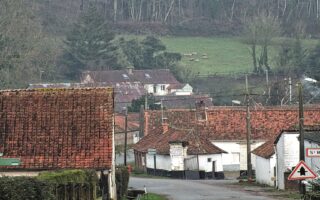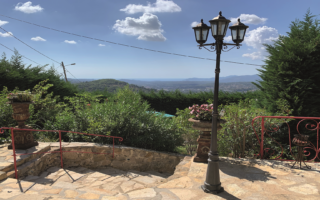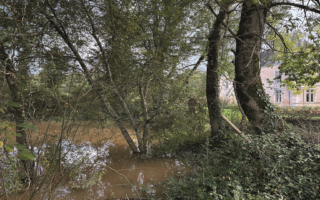Riding high in Languedoc
Nicola Christinger meets a British women who has overcome many challenges to make a new life in the south of France
Verity Smith has been living in the vibrant city of Nîmes in Languedoc-Roussillon for over a year now. Nothing too unusual about that: the atmosphere and traditions of this energetic city combined with its culture and sophistication make it a fascinating place for an expat to live. But for this talented singer-songwriter, author and champion dressage rider, the move to France has presented new challenges due to the fact that Verity is blind.
Originally diagnosed with Stargardt’s disease, Verity lost her sight at nine years old and has since been advised that there is no true diagnosis nor a cure for her degenerative sight condition. As a child at boarding school in Britain, she spent most of her holidays in France after her parents moved to the small village of Sauzet outside Nîmes. When her father died three years ago, Verity made the decision to move from London to France full-time in order to be nearer her mother.
Fiercely independent, she wanted to be somewhere that wouldn’t hinder her ability to get around by herself. “I had always loved Nîmes and I felt that from here I could travel to anywhere in the world,” says Verity. “I can easily walk to the train station, from where the TGV goes to Paris, Marseille or Montpellier. Nîmes has its own little airport too, so I am completely independent.”
The origins of Nîmes date back to the sixth century BC and it has a rich Roman heritage including its famous amphitheatre, the Arènes de Nîmes. As a Languedoc city on the fringes of Provence, it is infused with the local fragrances, culinary delights and olive trees of the region. The culture of the area also encapsulates two of Verity’s passions in life: horses and music.
The Camargue, south of Nîmes is famous for its white horses, one of the oldest breeds in the world. It is also renowned for Doma Vaquera, a Spanish style of riding that grew out of using horses to handle fighting bulls. After leaving school, Verity went to work at EMI in London and as a singer has worked with producers and arrangers such as Sacha Skarbek, the Grammy-nominated and Ivor Novello award-winning writer of ‘You’re Beautiful’ for James Blunt; and Paul Herman, an award-winning writer and producer for the singer Dido.
“Music had no bearing on me losing my sight, which is why I wanted to make it my career. I often feel that being blind has enabled me to be more focused. Perhaps if I had been sighted, the choices would have been greater, but because I wasn’t able to do ‘everything’, I took certain paths that allowed me to be very successful,” she says. “What I love about this region is that music is something that everyone has a go at. It’s a real celebration.
“There is a true Hispanic and flamenco influence, which was a real surprise. A huge number of internationally famous artists are from here: the guitarist Manitas de Plata, who has sold more than 90 million albums worldwide, was born in Sète and The Gypsy Kings still play in the Camargue,” she says.
Verity adds that the area has really inspired her. She has been working with Jason Carter, a leading classical Spanish guitarist who features on her forthcoming solo album Snakes and Ladies, due out in March 2013. “This region has taken my music in a new direction; added a sunshine feel to the style. It has made my music less clinical and commercial, more invigorating, organic, passionate and alive.”
When it came to finding the right property, Verity had a very clear idea of what she wanted in her dream home. “I visited so many apartments in the historical centre of town where I wanted to be,” says Verity, as she recalls her search for the place she now calls home.
“I knew I wanted an old building with lovely features. It was probably about the 20th flat I saw, and on a small pedestrianised road; it reminded me of The Lanes in Brighton. As soon as I walked in, I sensed the wonderful amount of light through the huge floor-to-ceiling windows. I am very sensitive to light and dark, and I felt a beautiful, homely atmosphere almost immediately,” she says.
The Nîmois are known to be fiercely proud of their traditions and the city excels in its reputation as an exciting, cultural, gastronomic heaven. Verity and her guide dog Uffa have become well-known figures on the streets of Nîmes since she moved into her apartment last year. “All the shop-owners know me. They know what coffee I like, and in Les Halles, the indoor food market, the stallholders know what I like to buy. Everyone is so welcoming and very, very kind,” says Verity.
She has experienced this kindness in the UK, but less so in other countries such as Sweden, where she trained in dressage and received a very negative reaction. “I think it has something to do with the weather,” she reflects. “When the sun’s shining, people are happier and more open.”
Verity acknowledges that the attitude towards Uffa has been overwhelmingly positive too. “I’ve travelled extensively throughout Europe; dogs are well accepted in public places in France and by law guide dogs have to be accepted everywhere. In France they are not just accepted and tolerated but genuinely welcomed,” she says.
Uffa is a cross between a giant poodle and a labrador – the less well-known breed of labradoodle. Like his owner, he is quite unconventional and Verity loves the fact that her loyal canine companion differs from the image of the stereotypical guide dog.
“I thought it was great, a guide dog in disguise!” laughs Verity. “Funnily enough, he is half-French, half-English and has this big black mass of shaggy hair, with a long fringe over his eyes – not so helpful given his job!”
Verity returns with Uffa to the Guide Dogs for the Blind Association in the UK (now known simply as Guide Dogs) for annual assessments and was amazed at how well he has adjusted to life across the Channel. “He has coped brilliantly. Things happen here in Nîmes that you don’t see in Oxford Street, like a herd of bulls raging down the street followed by 10 men on white horses.
“He takes it all in his stride and just sits and waits. Mind you, his father’s French genes are sometimes too much: if a dainty little mademoiselle chienne catches his eye, he’s off!”
As the new girl on the block, Verity admits that mixing with the local French community has played a key part in making her feel more settled. “Blind or not, if you make a decision to move to another country, there is always an element of anticipation. Like joining a new school, you will only be the new girl for a little while; if you embrace it as an experience, try to learn the language and new culture, you begin to feel more settled,” she advises.
She has also discovered a large network of support from organisations and associations in the Languedoc region, which gave her confidence.
“I am not really a ‘joiner’ but I wanted to know what support was available, should I need it. I made contact with various associations such as disabled sport groups and the guide dog association over here,” she says. “The good thing about moving away from your home country is that you do actually investigate much more deeply what is out there. You may never call upon the groups once you settle in, but it is nice to know that they are there.”
Music is just the tip of the iceberg in her exhaustive and admirable list of activities. She is also singing, starring and swinging in a French trapeze show, supported by the French equivalent of the Arts Council, and due to tour throughout 2013. Although not an obvious choice, Verity was excited and intrigued when she was initially contacted.
“I was always really interested in being part of the local performance scene. When I was approached by a performance company, Oncore Creations, to use my music in the show, I jumped at the chance to get involved. Little did I know that this jump would end up with me literally jumping off a platform onto a trapeze!”
The area around Nîmes has a long history of circus theatre and the tradition is well-respected and supported. The show, entitled Une Drôle de Maison, has been co-written by Verity and is about a blind woman’s internal deliberation about love, following her anticipation, anxiety and eventual courage in starting a new relationship, until at last she allows herself to fall in love.
Verity’s own courageous spirit showed itself at a very young age; she started riding aged just three and was competing at five years old. When she lost her sight, Verity switched from show jumping to dressage and in 1992, represented Britain as a member of the Para-Equestrian Dressage team at the World Championships in Denmark.
In training to qualify for the 2012 London Paralympics, Verity suffered a double blow when her grand prix champion horse, Marcus, had to be put down and Verity herself was injured in a car accident. “It’s the one time in your life when you can represent your country, in your country; I was gutted at not being able to participate,” she says.
Ever the optimist, however, Verity and her sponsorship manager are now looking for a new sponsor and horse in order to start training for Rio de Janeiro 2016.
“After London 2012, dressage trotted up the leader board of popular sports and, due to the amazing coverage of the Paralympics, people have been inspired by what can be achieved. For me, to represent Britain in the 2016 Paralympic Games would be an honour,” says Verity.
A firm believer in embracing life and all its challenges, Verity has never regretted moving to Nîmes. “Coming to live here opened my eyes metaphorically and I think change is a good thing. I want to spend Christmases here. I want to relish the long summer months; it gives me that warm feeling. France now feels like home.” LF
You can follow Verity’s blog at www.thegirlwhoneverlooksdown.blogspot.fr
Share to: Facebook Twitter LinkedIn Email


